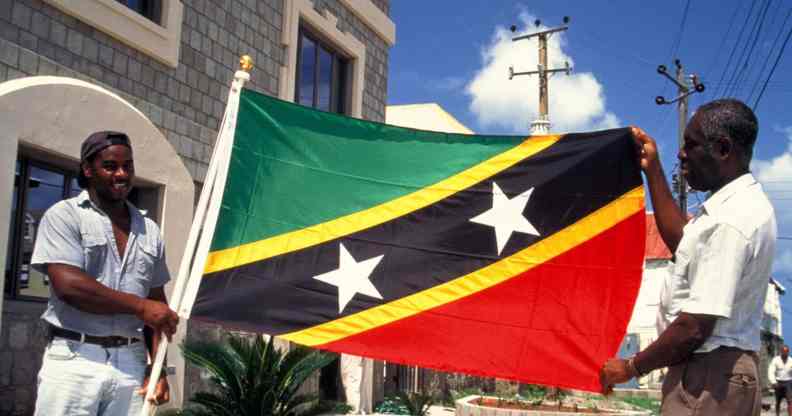Caribbean court strikes down Saint Kitts and Nevis’ colonial-era gay sex ban in ‘transformative’ move

Saint Kitts and Nevis has scrapped colonial-era laws that banned homosexuality. (Jeff Greenberg/Universal Images Group via Getty Images)
Saint Kitts and Nevis’ colonial-era law banning same-sex relations has been struck down in a “historic moment” for the Caribbean country.
On Monday (29 August), the Eastern Caribbean Supreme Court struck down sections 56 and 57 of the Offences Against The Person Act which banned the “abominable crime” of “buggery”.
The law carried a maximum penalty of 10 years with hard labour.
While no evidence showed the longstanding provisions had been enforced in recent years, it seemingly justified the discrimination and violence LGBTQ+ Kittitians and Nevisians face due to societal stigma and shame.
Judge Trevor Ward overturned the parts of the act that criminalised “unnatural offences” and compared them to “bestiality”, which he said was unconstitutional.
He wrote in his judgment: “The absolute nature of the prohibition created by sections 56 and 57 are not reasonably justified in a democratic society in circumstances where they proscribe sexual acts between consenting adults in private, which involve no element of public conduct or harm to, or sexual acts, with minors.”
“To the extent that it criminalises the private lives of gay persons in this year, the law is excessive and arbitrary,” he continued, adding that the sections “fail to meet the constitutional qualification of being … in the interest of public morality.”
Ward added: “Section 56 of the act shall be read as if the words ‘This section shall not apply to consensual sexual acts between adults in private’ were added at the end of the section.”
The court’s verdict immediately went into effect.
“This is a transformative journey and a step to full recognition of LGBTQ persons across the Organisation of Eastern Caribbean States,” Kenita Placide, executive director of the Eastern Caribbean Alliance for Diversity and Equality (ECADE), said.
“An affirmative decision means a yes to privacy and a yes to freedom of expression.”
Jamal Jeffers, a gay man, brought the constitutional challenge in January 2021 arguing that sections 56 and 57 breached constitutional rights to freedom of expression and privacy, and should be made null and void.
Joined by advocacy group St Kitts and Nevis Alliance for Equality, the claimants sought orders for same-sex acts to not be an offence if committed privately between “persons 16 years of age or more”, their motion read.
Saint Kitts and Nevis were among the first islands in the Caribbean to be colonised by the British, bringing with them centuries-old laws that outlawed homosexuality.
Section 56 read: “Any person who is convicted of the abominable crime of buggery, committed either with mankind or with any animal, shall be liable to be imprisoned for a term not exceeding ten years, with or without hard labour.”
In 2012, the original four-year penalty dealt out by section 57 was beefed up to a decade in a revised version of the Offences Against The Person Act. The nation even resisted calls from the United Nations Human Rights Council in 2021 to repeal the laws.
Former British colonies Barbados, Dominica, Guyana, Grenada, Jamaica, St. Lucia, and St. Vincent and the Grenadines all have similar buggery laws in the books.
But the tides are changing. Barbados’s prime minister promised LGBTQ+ rights would be at the centre of Barbados’ future as a republic when it removed the Queen as head of state in November 2021, while the Eastern Caribbean Supreme Court scrapped sodomy laws for Antigua and Barbuda in July – and activists are hopeful more will follow.
“We are witnessing a historic moment in the Caribbean in which antiquated, colonial-era laws are being challenged and struck down,” said Maria Sjödin, executive director of global LGBTQ+ rights group OutRight Action International.
“We are awed by the strategic persistence of activists in the region who are leading the charge to ensure that human rights are advanced and that discriminatory, outdated law like this is overturned. Hopefully, the remaining countries in the region and beyond will follow.”

